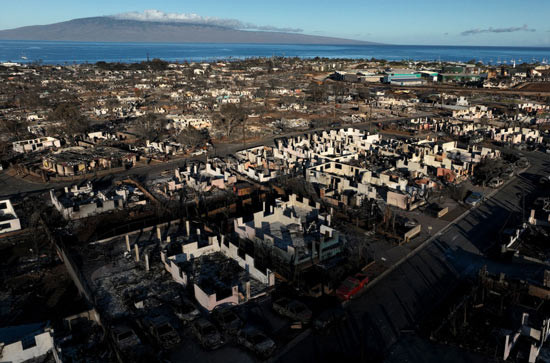Learning Center
Hawaii Wildfires State of Emergency - Tax Implications

The United States government is providing tax relief for eligible Hawaii residents amid the rampant wildfires on both Maui and the Big Island. The President has declared a disaster for all parts of Hawaii affected by the wildfires. Disaster area taxpayers will now have until February 15, 2024, to file various federal individual and business tax returns and make tax payments.
Tax Implications of the Hawaii Wildfires State of Emergency
Tax Payments - The February 15, 2024, deadline also applies to any payment normally due during this postponement period, Aug. 8, 2023, through February 15, 2024, including quarterly estimated tax payments, quarterly payroll, and excise tax returns.
Who Qualifies for the Filing Postponements - The IRS automatically provides filing and penalty relief to any taxpayer with an IRS address of record located in the disaster area. Therefore, taxpayers do not need to contact the agency to get this relief. However, if an affected taxpayer receives a late filing or late payment penalty notice from the IRS that has an original or extended filing, payment or deposit due date falling within the postponement period, the taxpayer should call the number on the notice to have the penalty abated.
In addition, the IRS will work with any taxpayer who lives outside the disaster area but whose records necessary to meet a deadline occurring during the postponement period are located in the affected area. Taxpayers qualifying for relief who live outside the disaster area need to contact the IRS at 866-562-5227. This also includes workers assisting the relief activities who are affiliated with a recognized government or philanthropic organization.

Justin Sullivan / Getty Images News via Getty Images
Claiming Casualty Losses - Affected taxpayers in a federally declared disaster area have the option of claiming disaster-related casualty losses on their federal income tax return for either the year in which the event occurred, or the prior year. Individuals may deduct personal property losses that are not covered by insurance or other reimbursements. Affected taxpayers claiming the disaster loss on their return must include the FEMA disaster declaration number, FEMA-DR-4724-HI.
Other Relief – The IRS will waive the usual fees and requests for copies of previously filed tax returns for affected taxpayers. Taxpayers should put the assigned Disaster Designation, California, severe winter storms, flooding, landslides and mudslides, in bold letters at the top of Form 4506, Request for Copy of Tax Return, or Form 4506-T, Request for Transcript of Tax Return, as appropriate, and submit it to the IRS. Those who had their returns professionally prepared should contact their tax preparer for copies of past records.
Affected taxpayers who are contacted by the IRS on a collection or examination matter should explain how the disaster impacts them so that the IRS can provide appropriate consideration to their case.

The Washington Post and many other news outlets reported on the unexpected fires, which claimed at least 106 lives. Per the Post, “strong winds linked to Hurricane Dora hampered efforts by authorities to contain the flames and also ignited fires on the Big Island.”
Anecdotal posts and videos on social media indicated that some locals and visitors in the seaside town of Lahaina had submerged themselves in the Pacific Ocean to avoid the flames. At least a dozen of these individuals were subsequently rescued by the United States Coast Guard, according to a San Francisco Chronicle report published on the evening of August 9.
Although the fires have now subsided, there is a long recovery period ahead for the Hawaiian people impacted by the disaster. CNN reported that over 2,200 structures in Lahaina alone sustained damage, and Governor Josh Green referred to the wildfires as “likely the largest natural disaster in Hawaii's state history.”
NEVER MISS A STORY.
Sign up for our newsletters and get our articles delivered right to your inbox.
Rose Tax & Financial
Cedar Crest, New Mexico 87008
Sat: 10:00am to 2:00pm
Check the background of your financial professional on FINRA's BrokerCheck
Avantax affiliated Financial Professionals may only conduct business with residents of the states for which they are properly registered. Please note that not all of the investments and services mentioned are available in every state. Securities offered through Avantax Investment Services℠, Member FINRA, SIPC, Investment Advisory services offered through Avantax Advisory ServicesSM, Insurance services offered through an Avantax affiliated insurance agency. 3200 Olympus Blvd., Suite 100, Dallas, TX 75019. 972-870-6000.
The Avantax family of companies exclusively provide financial products and services through its financial representatives. Although Avantax Wealth Management® does not provide or supervise tax or accounting services, Avantax representatives may offer these services through their independent outside business. Content, links, and some material within this website may have been created by a third party for use by an Avantax affiliated representative. This content is for educational and informational purposes only and does not represent the views and opinions of Avantax Wealth Management® or its subsidiaries. Avantax Wealth Management® is not responsible for and does not control, adopt, or endorse any content contained on any third party website.
This information is not intended as tax or legal advice. Please consult legal or tax professionals for specific information regarding your individual situation.
The information being provided is strictly as a courtesy. When you link to any of the web sites provided here, you are leaving this web site. We make no representation as to the completeness or accuracy of information provided at these web sites. Nor is the company liable for any direct or indirect technical or system issues or any consequences.
For Important Information and Form CRS please visit https://www.avantax.com/disclosures.